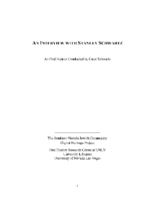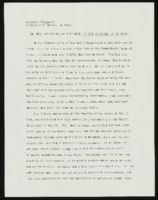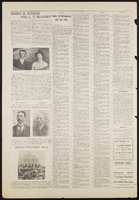Search the Special Collections and Archives Portal
Search Results

Transcript of interview with Stanley Schwartz by Carol Schwartz, March 1, 1980
Date
Archival Collection
Description
Interview with Stanley Schwartz by Carol Schwartz on March 1, 1980. Stanley talks about coming to Las Vegas in 1951 to open a clothing business on Main Street, Schwartz Brothers Clothing. He compares the business district of the 1950s to the district in 1980, and advertising opportunities in the newspapers and on the radio. Schwartz talks about suit styles and changing preferences of buyers, and moving the store to Second Street, then Fremont Street, then to Maryland Square Shopping Center. In 1970, he changed the focus of the clothing store to "big and tall" and talks about the importance of customer service in retaining customers. He mentions Al Benedict and Herb Tobman as people he admired.
Text

"An Impact of the Moulin Rouge Hotel on Race Relations in Las Vegas": manuscript draft by Roosevelt Fitzgerald
Date
Archival Collection
Description
From the Roosevelt Fitzgerald Professional Papers (MS-01082) -- Unpublished manuscripts file.
Text

Transcript of interview with James Bonnell by Gerald L. Conner, February 22, 1977
Date
Archival Collection
Description
On February 22, 1977, James Bonnell interviewed Gerald L. Connor (born 1930 in Boston, Massachusetts) about his experiences in Nevada and his work in education. Connor first talks about his move to Nevada while he was a member of the United States Air Force. He then discusses his education, including that at the University of Nevada, Las Vegas, and also describes his church membership. Connor later talks about changes in the schools and school district, the growth of gambling and properties located in Downtown Las Vegas and the Las Vegas Strip, and the early atomic tests at the Nevada Test Site. He also describes in detail his political activity and involvement with the Democratic Party, including his work with candidates for the offices of Nevada Governor and United States Senator. Towards the end of the interview, Connor talks about events such as Helldorado, the growth of the city over time, and his thoughts on the future of Las Vegas.
Text

Transcript of interview with Hal G. Curtis by Bill Teepe, February 24, 1977
Date
Archival Collection
Description
On February 24, 1977, Bill Teepe interviewed Hal G. Curtis (born 1926 in Galt City, California) about his life in Southern Nevada. Curtis talks first about his work on the Union Pacific Railroad before discussing changes and development in Las Vegas, including development on the Strip and Downtown areas. He also talks about Block 16, the El Rancho Vegas fire, social clubs, and religion.
Text

Transcript of interview with Mary & Bruce Eaton by Beatrice Scheild, March 8, 1975
Date
Archival Collection
Description
On March 8, 1975, Beatrice Scheid interviewed Mary and Bruce Eaton about their lives in Boulder City, Nevada. Mary first talks about her life in the early days of Boulder City, specifically the influences of the churches and schools. She also talks about housing, transportation, and her career as an educator. Bruce (born 1904 in Toronto, Kansas) also talks about his life in Boulder City and his arrival to Southern Nevada as he sought employment in working on the building of Hoover Dam. Bruce talks about his employment with Six Companies, Inc. and discusses topics such as the employment wages, his and Mary’s experiences in building a house, and their experiences in buying a house built by Six Companies. Bruce also talks about the roles of Sims Ely, the city manager of Boulder City, and Frank Crowe, the construction superintendent of Six Companies. Bruce then discusses the issues of worker’s compensation as it related to work on the dam, and he describes, in detail, the cooling system us
Text

Transcript of interview with Herbert & Erma Holtam by Marc Hechter, February 7, 1976
Date
Archival Collection
Description
On February 7, 1976, collector, Marc Hechter interviewed Herbert and Erma Holtam in the collector’s home in Las Vegas, Nevada. This interview covers the history of the early Las Vegas Valley area. The discussion includes an in-depth overview of the Helldorado Parade and Helldorado Village. The building of the hotels on the Strip, homesteading, and local housing developments, are also discussed.
Text

Transcript of interview with Judith D. Steele by Barbara Tabach, November 24, 2014
Date
Archival Collection
Description
In this interview she talks about student teaching in East Harlem, her teaching experiences in Providence, Rhode Island and the decision to reside in Las Vegas. When she was finally able to be promoted outside of the classroom, among her highlights was being Director of Special Education Programs and Services for the Clark County School District. In 1991, she served in a dual role as Manager of the Office of Development and Education Improvement for CCSD and Executive Director of the newly incorporated Clark County Public Education Foundation, an independent, non-profit organization established to improve public education in Southern Nevada. Among her many community activities is serving on numerous board and founder of the Henderson Arts Council.
Text

Transcript of interview with Stanley Hyman by Eleanor Doble, March 10, 1981
Date
Archival Collection
Description
Interview with Stanley Hyman by Eleanor Doble on March 10, 1981. In this interview, Hyman discusses his job as a district manager for Farmers Insurance group, which brought him to Reno, Nevada in the 1940s, then to Las Vegas in 1951. He talks about the population growth of Las Vegas, and comments that the infrastructure of the city did not improve with the population growth. He also talks about some local disasters, the economy, entertainment, and the convention business in the area. He speaks briefly about recreation at Lake Mead and Mount Charleston, and atomic tests. The interviewer asks about women in leadership positions in hotels and in the insurance business.
Text

Transcript of interview with Sherwin "Scoop" Garside by David Anderson, March 25, 1976
Date
Archival Collection
Description
On March 25, 1976, David Anderson interviewed Sherwin “Scoop” Garside (born May 26, 1915 in Tonopah, Nevada) about his life in Southern Nevada. Garside first talks about his father’s business in running an early Nevada newspaper and his personal knowledge of the early mining that took place in different parts of Nevada. He also talks about living in the town of Tonopah, the American Indians who lived in the area, and his experiences from living in Las Vegas. Garside also mentions the beginnings of gambling in Las Vegas, the population boom periods of Las Vegas, and his experiences in witnessing the aboveground atomic testing.
Text

